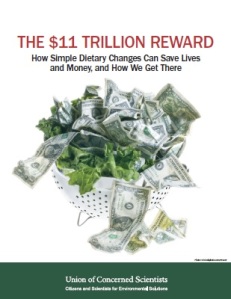Increasing the consumption of fruits and vegetables could save more than 100,000 lives and $17 billion in health care costs from heart disease each year in the United States, according to a new report by the Union of Concerned Scientists.
 The report, The $11 Trillion Dollar Reward, explains that better federal agricultural policies, designed to encourage production of healthy food instead of processed junk foods, will help reap those benefits.
The report, The $11 Trillion Dollar Reward, explains that better federal agricultural policies, designed to encourage production of healthy food instead of processed junk foods, will help reap those benefits.
If Americans consumed just one additional serving of fruits or vegetables a day, the nation would save $5 billion in health care expenditures and prevent 30,301 heart disease and stroke deaths annually. And if Americans were to go a step further and eat a full 2.5 cups of vegetables and two cups of fruit daily, as recommended by federal dietary guidelines, it could prevent 127,261 deaths each year and save $17 billion in medical costs. The economic value of the lives saved from cardiovascular diseases is an astounding $11 trillion, according to the report.
The report researchers advocate for cost-effective policies that increase access to and reduce the cost of domestically grown fruits and vegetables for consumers, especially for low-income consumers who are hardest hit by cardiovascular disease and other diet-related illnesses. Low-income neighborhoods–where some 30 million Americans reside–are often far from grocery stores and other sources of fresh produce, hindering access.
Current federal agricultural policies channel taxpayer dollars into subsidies for commodity crops, such as corn and soybeans, which are used as feed for livestock, biofuels and as processed food ingredients. These policies offer few incentives for farmers to grow fruits and vegetables–effectively discouraging production of the very foods federal dietary guidelines recommend.
A three-minute video produced by UCS summarizes how we can achieve an $11 trillion reward through forward-looking agricultural policies.
Citation:
1. O’Hara JK. The $11 Trillion Reward: How Simple Dietary Changes Can Save Lives and Money, and How We Get There. Cambridge, Mass.: Union of Concerned Scientists, 2013.




